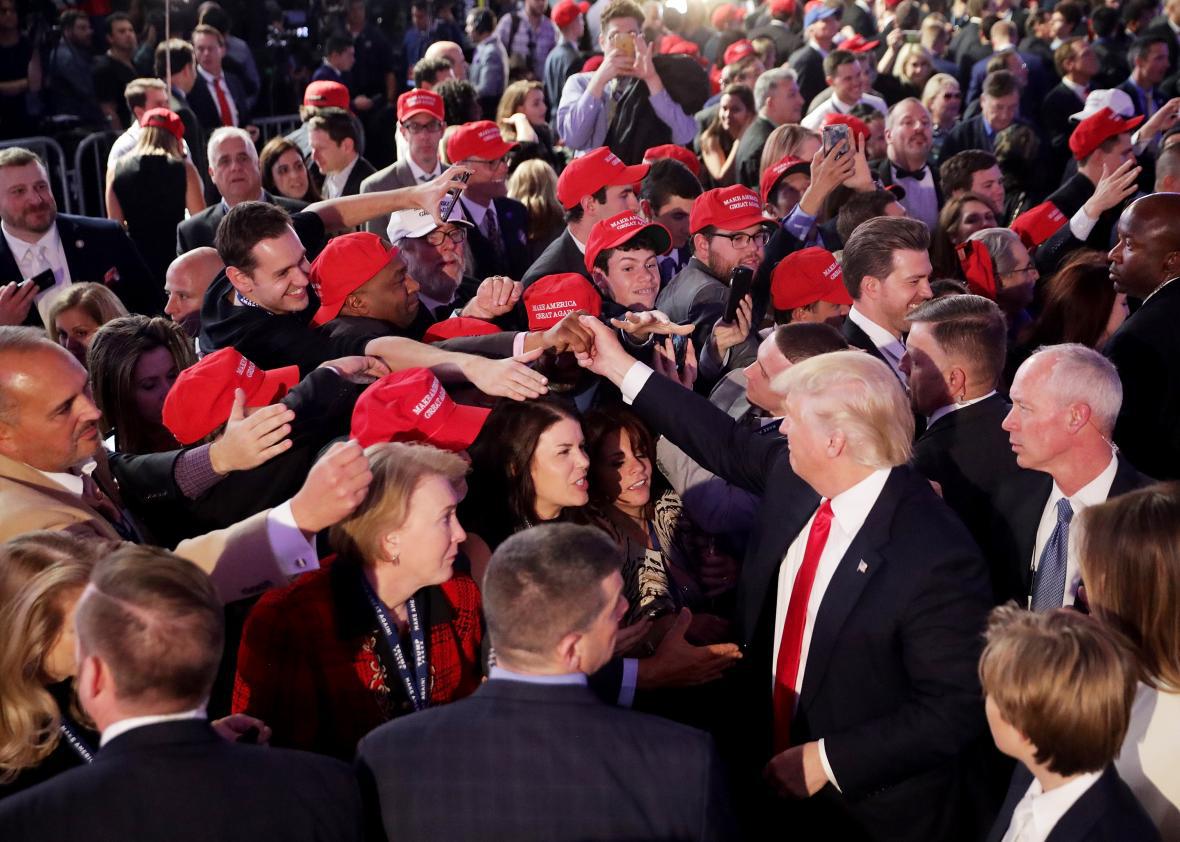Women in America are not pleased with the country’s current trajectory, according to a Pew Research Center survey conducted in April. Just 29 percent of women polled said they have “quite a lot” of confidence in the future of the U.S., down from 43 percent who felt that way when surveyed in October 2015.
Men, however, have gotten increasingly psyched about the state of the U.S. in the past year and a half. In 2015, 47 percent said they had great confidence in the future of the nation. Now, that proportion sits at 53 percent. Something must have happened between October 2015 and April 2017 to depress women’s hopes for the future and elevate men’s. Something big! Hmm.
There was a campaign season and an election, sure. But the widening of this gender gap from 4 to 24 points cannot be explained by simple political-party demographics. Surveys show that Republicans of both genders are more confident about the country’s future now than they were in 2015, and Democrats of both genders are less confident than they were 18 months ago. But Republican men are especially stoked about the new state of the U.S. and Democratic women are especially wary. When surveyed, 43 percent of the former were very confident about the future of the U.S. in 2015, a segment that grew to a whopping 72 percent in April’s survey. Just under half of all surveyed Democratic women were very confident 18 months ago; now, less than half that—20 percent—say they are. The proportion of Republican women who had “quite a lot” of confidence grew more modestly, from 36 to 44 percent, and the corresponding slice of Democratic men shrank more modestly, from 52 to 38 percent.
Where men and women of the same political party once agreed, more or less, on the country’s prospects, they now see things fairly differently. In 2015, there was a 7-point gender gap among Republicans and a 4-point gender gap among Democrats on the confidence question. Those gender gaps have ballooned to 26-point and 18-point chasms.
To my mind, this isn’t an altogether surprising shift. After the election, a PerryUndem poll found that a majority of Republican men believe it’s easier to be a woman than a man in America today; last summer, another survey found that a majority of men—and three-quarters of Republican men—think sexism in America is “largely gone.” Seeing an unapologetically ambitious woman known for flouting gender norms get within a ballot’s breadth of the presidency only to get crushed by an admitted serial abuser must have been exhilarating for men who’ve convinced themselves that they’re oppressed on account of their gender. Witnessing the against-all-odds rise of a man who proudly treats every woman in his orbit, including his daughter, as a vessel for sex or not-sex must have been like watching the clock turn back to a golden era for men. Watching the Trump administration clamp down on the rights of women around the world—the rights to lifesaving health care, information about their own bodies, and the ability to plan and pace their pregnancies—must have been a real patriotic power trip for men who worry that basic autonomy for women means less money, power, and control for men.
The events of the past 18 months that have encouraged men have had the opposite effect on women. Less than one-quarter of U.S. women say they’re “satisfied” with how things are going in the country these days. They’ve heard mainstream Republican politicians extol the virtues and advance the career of a sexual predator, then heard that predator use his platform to defend other abusers of women. Between October 2015 and April 2017, they watched hours of footage of their fellow Americans gathering together for the primary purpose of getting to call a powerful woman a bitch and a cunt in front of national news reporters. When Republican legislators have voted to slash health care coverage and protections, they’ve saved their most punishing provisions for women. The very things that make 2017 a crappy year to be a woman in the U.S. are the things that have made so many Republican men love America again. The fact that so many Democratic men think things are bad, but not that bad, indicates that women are carrying a disproportionate load of the dispiriting effects of Trump’s rise so that men can feel better about their spots in the social pecking order.
The Pew Research Center survey offers another telling, if less dramatic, insight into gender and wellbeing in the U.S. In both 2015 and 2017, women of both parties felt less confident than the men in their respective parties about the future of the country. And only 43 percent of women said they think 2017 will be a better year for them than 2016, while 56 percent of men—the exact same proportion as those surveyed in January 2016—felt that way. Consider the physical and mental health implications of these statistics: Less than a third of U.S. women are confident in their country’s prospects, far less than men with similar political views. Less than half are optimistic about their immediate future. Individually, sexist politicians and policies can prevent women from accessing health care or holding their abusers accountable. Together, they can add up to a debilitating, demoralizing state of melancholy even more damaging than the sum of its parts.
